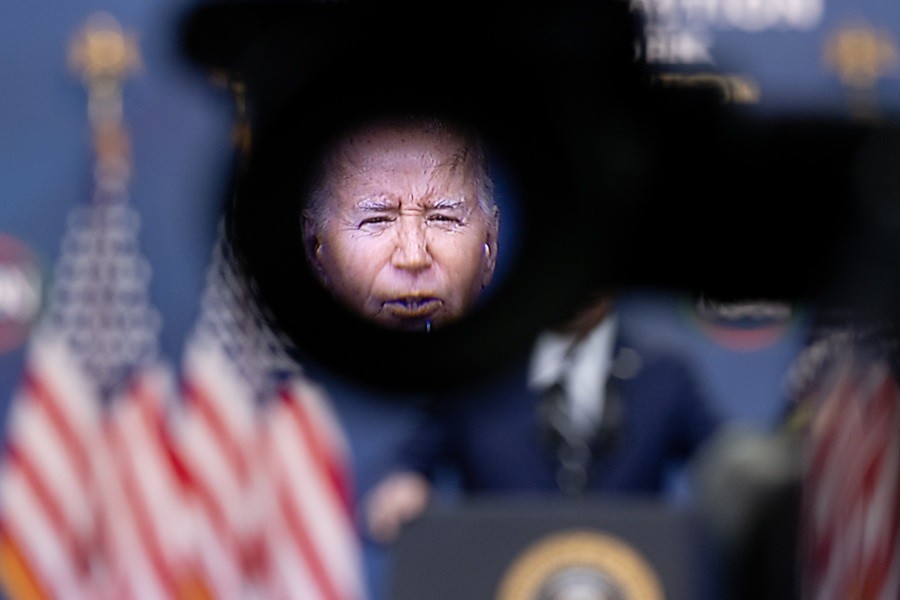
New York Times’ New Executive Editor Has History of Steering Clear of Controversial Reporting
By: Kevin Gosztola
New York Times executive editor Jill Abramson has been fired and replaced by Dean Baquet, who was managing editor at the Times. But how will he defend the right to publish when confronted by opposition from government officials?
What will Baquet do to encourage and promote investigative journalism? What responsibility may he show to sources?
As executive editor, Abramson publicly condemned President Barack Obama’s administration for pursuing a record number of leak cases that essentially have criminalized the news gathering process. She spoke out in defense of Times national security reporter James Risen, who the administration has subpoenaed in a leak prosecution in order to force him to testify and reveal information about his source.
It was actually Baquet’s decision to publish a major feature story on CIA whistleblower John Kiriakou in January 2013 before he was sentenced. Kiriakou had asked Times journalist Scott Shane to wait until after so it did not impact his sentencing, but, as Baquet told Times public editor Margaret Sullivan, “We felt competitive pressure.”
Steve Coll was about to publish a similar story on Kiriakou for The New Yorker. It was more important to not get scooped than to respect an agreement that had been made with a source. (Indeed, the government claimed in its sentencing memorandum that the Times story was evidence that Kiriakou had repudiated his “acceptance of responsibility for the criminal conduct he committed.”)
In September 2013, Abramson and Baquet went to Washington to give officials a “respectful hearing” before publishing a story on the National Security Agency’s ability to break encryption. The decision to publish was “not a particularly anguished one.”
With regards to NSA stories, Baquet told Times public editor Margaret Sullivan in August 2013, “Once you get past the first stories by The Guardian and The Post, no one has broken more ground than we have.” He believed the Times had been intensely interested in the disclosures from Edward Snowden.
“We reacted the way you’re supposed to react when you get scooped,” and, “They beat us, that’s life. We’ve followed it and we’ve had some significant stories,” Baquet added.
To the idea of a reader that the “New York Times today is not The New York Times of the Pentagon Papers era,” Baquet heavily disagreed saying it was “unfair criticism.” He pointed to the disclosures from WikiLeaks and the “paper’s willingness to push back against the government.” And, even though the story on warrantless wiretapping story by Risen and Eric Lichtblau was initially spiked, he said that “took courage to print.”
But Baquet went along with the government and supported the decision to not publish the location of a secret drone base in Saudi Arabia.
In February 2013, Baquet said “The Saudis might shut it down because the citizenry would be very upset. We have to balance that concern with reporting the news.”
Essentially, if it would make a US government policy or operation unpopular in a country, Baquet was suggesting it was the role of journalists to withhold information so the government could continue to conceal information from that country’s citizens. How exactly is that appropriate?
The location was eventually revealed. Though somewhat buried in the story, they went ahead and mentioned it because, Baquet said, “the architect of the base and drone program” had been “nominated to head the CIA” so the location was no longer a “footnote.”
Unfortunately, Baquet did not recognize the location was a story in and of itself. Tom Engelhardt of TomDispatch.com appropriately contended that they should have a “felt the obligation to publish it instantly with screaming front-page headlines and a lead editorial demanding an explanation.” It was just the kind of project that should have had the CIA and White House fearing serious blowback and journalists could have been leaders in trying to figure out what risks this base posed to “national security.” [Note: In contrast to the Times, The Washington Post put the existence of a secret drone base in the headline of their story when they revealed it on the same day.]
When Sullivan asked Baquet why the Times had not followed-up on a Guardian story in September 2013 that revealed how NSA data on American citizens is shared with Israeli intelligence, he responded, “I didn’t think it was a significant or surprising story.”
He further justified ignoring it, “I think the more energy we put into chasing the small ones, the less time we have to break our own. Not to mention cover the turmoil in Syria.”
It was not a “small story.” As Scott McConnell at the American Conservative understood, “The ugly truth we now know is that two months after assuming office, Obama or an underling acting in Obama’s name signed an agreement to transfer Americans’ personal and private information to Israel.”
On the ten-year anniversary of the Iraq War, Baquet defended the paper’s “low-key approach” to marking it.
“The war itself has been dissected to a tremendous degree,” he told Sullivan. “You have to have something new or fresh to say.”
The paper could have said something about the Iraq War architects who continued to display unrepentant support for the war. The paper could have said something new about the legacy of torture and cancer in Iraq in the country after the war. The paper could have said something fresh on how the government had gone to war on false pretenses ten years ago and there were crimes committed but no one would ever be held accountable.
Some humility and decency on the part of the newspaper could have been displayed in an appropriate reflection on what happened ten years ago when the Times played a key role in promoting President George W. Bush’s manufactured case for war. They could have looked at whether it could happen to the news organization again.
In fact, readers were concerned that coverage in the Times on Syria represented a drumbeat for war similar to what happened in the run-up to the Iraq invasion. Sullivan asked Baquet in August about any lessons learned from Iraq and how they were relevant to covering Syria. Iraq had not come up in editorial discussions.
“I’ve never said, ‘Let’s remember what happened with Iraq,’” Baquet declared. “I don’t think it’s necessary. I haven’t had to instruct the staff to ask hard questions. They are doing that,” and “The press’s coverage of Iraq always lurks in the background. But it was a long, long time ago.”
It was not that long ago though. In 2013, US troops had only begun to officially and formally withdraw two years ago. There are many US veterans who do not think the war was long ago because they constantly relive it and have trouble healing. Then, there are the Iraqis, for whom the US left in power a brutal regime led by Prime Minister Nouri al-Maliki.
Baquet considered documents from WikiLeaks to be “pretty remarkable stuff” and believed there was a “tremendous public service interest in the publication of this information.” However, it was also his view that he was a journalist and Assange was not.
“I view myself as a journalist and I don’t view Julian Assange as a journalist in my view, but what occurred was a journalist act and I’m uncomfortable with somebody being prosecuted for a journalistic act that had an important public service,” he told the Australia Broadcasting Corporation.
The story was about the estimate of the number of people who ended up, by DOD’s account, as being engaged in terrorism or militant activity after leaving Gitmo. That still stands. The change was an acknowledgment that some assert that not everyone in Gitmo is truly a terrorist. Some critics have said that Gitmo is also filled with people who aren’t truly terrorists.
What mattered, however, was whether what the Defense Department was saying was true or not. It served the Pentagon to try and balance differing viewpoints, government versus critics, especially when what the Pentagon was claiming was pure fabrication.
Baquet supported not using Chelsea Manning’s new name when she announced she was going to make a transition to becoming a woman.
Generally speaking we call people by their new name when they ask us to, and when they actually begin their new lives…In this case we made the judgment readers would be totally confused if we turned on a dime overnight and changed the name and gender of a person in the middle of a major running news story. That’s not a political decision. It is one aimed at our primary constituency–our readers.
This policy, however, would seem to promote transphobia. Even Sullivan understood, “Given Ms. Manning’s preference, it may be best to quickly change to the feminine and to explain that.” It also suggests readers are stupid and won’t understand in the context of a story about a man declaring they are “female” that they would not be able to comprehend that person’s decision to change their name in addition to seeking medical procedures to change their body.
Finally, prior to his role as Times managing editor, he was Los Angeles Times editor and bowed to government pressure to not publish a story on documents AT&T whistleblower Mark Klein had on the company’s role in the NSA’s warrantless wiretapping program.
ABC News’ Brian Ross reported “then-Director of National Intelligence John Negroponte and then-director of the NSA Gen. Michael Hayden” had the story killed. Baquet claimed, “Government pressure played no role in my decision not to run the story,” and that the newspaper did not think they had a story. “We could not figure out what was going on.” Los Angeles Times reporter Joe Menn disagreed and was upset and Klein wound up going to the New York Times with his documents.
Abramson said during the “Sources and Secrets” conference in New York this year, “The responsibility that a news organization has to a source is to really live up to the word that is given by one of our journalists to a source.” She asserted the public had a right to know the dimensions and scope of all “eavesdropping programs” being used for surveillance as part of the “war on terror.”
“The Obama years are a benchmark for a new level of secrecy and control,” she later declared on “The Takeaway” radio program in April.
Whether Baquet will be as strong in his defense of freedom of the press as executive editor remains to be seen.
SOURCE: http://dissenter.firedoglake.com/2014/05/16/new-york-times-new-executive-editor-has-history-of-withholding-information-steering-clear-of-controversial-reporting/

